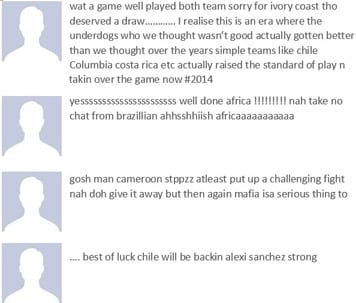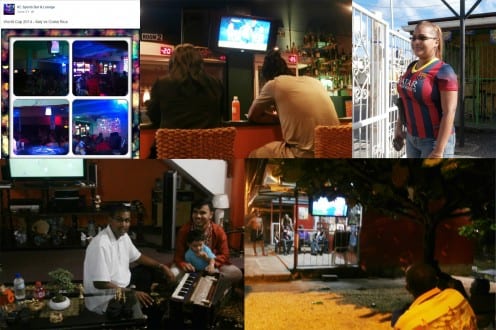Englishness, the World Cup and the Glades
By Daniel Miller, on 27 June 2014
Viewing the world cup from the perspective of a relatively homogeneous English site, The Glades, a dual village with a total population of 24,000, North of London, seems to bring out the ‘Englishness’ of this site compared to others around the globe.
At the time of writing England are already out of the World Cup, and most of the overheard conversation is about failure. England is ranked below the two teams, Italy and Uruguay, that beat them. Most experts felt they played quite well. So the results are pretty much in accordance with expectations. But this is not how things are seen here. Social bonding seems most effective when everyone agrees that England are ‘rubbish’. The humour on social media is typically self-deprecating, for example, a picture of the tour bus on sale with signs such as ‘only used twice’.
On social media we looked at all posting on 30 Instagram, 40 Twitter and 65 Facebook accounts during one week. This provided very clear support for my earlier claim that Facebook is no longer a peer to peer media for youth but has migrated to older people. Of the forty teenage Facebook profiles only one person used it for extensive football comment and this was because all his Twitter posts were set to also show on Facebook. Two others made a single relevant posting, one posted twice and that was it. World Cup references are more common for older users of Facebook with two people posting 11 times and one six times.
Instagram is only used to post ones own photos so the World Cup was not relevant. The core to young peoples posting today is Twitter. Of forty teenage sites, of those who posted during this week there were 5 males who posted frequent comments throughout the week. 11 males made just a few comments often around 3 to 5 while only 1 male made no comments at all. Of the females none posted extensively, half posted a few and half posted no world cup related tweets. Males tend to post either exclamations at events, general comments such as: ‘Why were Uruguay and Italy so poor against Costa Rica?’ Also popular is humour or critical remarks, such as:
‘I don’t get all the people that say England are good, we are shit, you just don’t want to admit it… when was the last time we won anything?’
‘Any coincidence that nations who sing their anthems with pride and feeling put in spirited performances, rather than our pathetic effort?’
Humour, as well as being self-deprecating, is often sarcastic, such as:
‘”BREAKING – Steven Gerrard to retire from international football after the World Cup” what a shame.’
Females add a gendered perspective, with posting such as: ‘why are all the Uruguay player’s shirts so so so tight? lol’, or cute pictures of the Brazilian player Oscar. If they comment on the football itself it may be apologetically such as ‘Uhh ohhhhh!! trust it to be Suarez (like i actually know what i’m talking about)’. Only those who comment extensively tend to mention games other than those played by England, or if they have connections such as family in Portugal and therefore support that team.
As well as self-deprecation the English qualities of modesty and reticence are much in evidence. There is relatively little public display. Across the two villages only 3 shops had extensive world cup influenced windows (see photos), 3 more had minimal and around 80 had none. Apart from an electrician, it was either the most traditional English butcher and pub or ethnic minority restaurants (Indian or Chinese) that had displays. There was only one example of commercial exploitation, a supermarket that had a selection called ‘tastes of the world cup’ with Brazilian watermelon Ivory Coast cocoa etc. Less than 1% of homes or cars displayed flags.
Going to pubs during the games when England were not playing one rarely saw more than 3 or 4 people that looked like they might have come especially to watch that game. During the England game one pub was crowded with 140 people another less than half that. The atmosphere was subdued. Apart from the collective shouting and celebration when the English goal was scored, there were no instances of people making remarks loud enough for anyone to hear other than their own companions.
THE WORLD CUP ON SOCIAL MEDIA WORLDWIDE
This article is part of a special series of blog posts profiling how social media is affecting how ordinary people from communities across the planet experience the 2014 World Cup.
- Brazil: “Why aren’t they protesting?”: low-income Brazilian’s views on the World Cup
- Chile: Seeing red: watching the World Cup in Northern Chile
- China (North): Online and under the covers: the World Cup and social media in rural China
- China (South): “Watch the World Cup – watch the fun and the world”
- India: Football World Cup 2014: Observations from Panchagrami
- Italy: ‘We are more united for the World Cup than for Christmas!’: the World Cup in Italy
- Trinidad: “It ain’t ova till its ova” – Spectacular sports and social media: the World Cup in El Mirador
- Turkey: “Turks have no other friends besides the Turks” – a Turkish saying
- United Kingdom: Englishness, the World Cup and the Glades
 Close
Close











